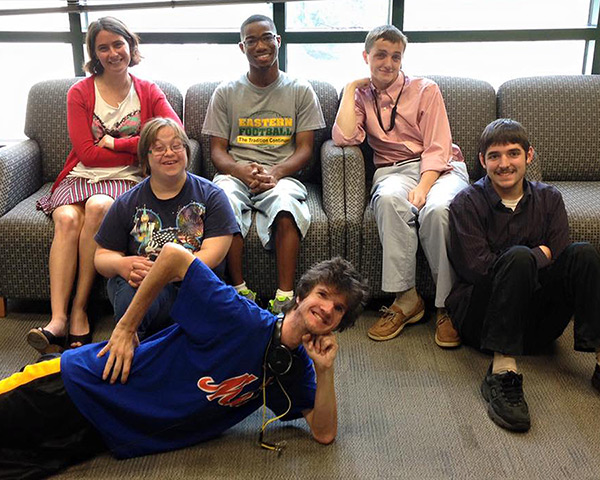BOONE—Ask any college student about their goals and the most likely response is finding a good job and supporting themselves after graduation.
Students with intellectual disabilities are no different.
Appalachian State University has received a five-year grant from the U.S. Department of Education totaling approximately $1.114 million to support its Scholars with Diverse Abilities (SDAP) program. The award represents 75 percent of the program’s cost. A university match totaling $371,578, or 25 percent of program costs, will help the university expand SDAP and support the faculty, staff and students associated with it.
Currently, six students are enrolled in SDAP’s two-year certificate program. The goal is to enroll five new students each year. Students audit classes, participate in university programs and complete internships – all of which is designed to help them acquire job and life skills that will enable them to live independently.
Begun in 2012, Appalachian’s SDAP program has attracted in-state as well as out-of-state students. The students live in university housing and pay and pay regular tuition and fees.
“Our mission is to be as inclusive as possible, so our students are engaged in as many activities and opportunities as a typical student would be engaged in as far as it’s reasonable to them,” said Anna Ward, who is the program director. Ward and professors Cate Smith and Mandy Harrison wrote and administer the DOE grant.
Smith is an assistant professor in the Department of Reading Education and Special Education in the Reich College of Education. Harrison is an associate professor in the Department of Recreation Management and Physical Education in the Beaver College of Health Sciences.
Ward said SDAP students audit courses in areas of their interest. They also take a class that focuses on basic skills needed to be successful in an inclusive setting, such as learning skills, time management, career readiness, resume building, conflict management and how to negotiate relationships.
“We have cultivated a good support network among several professors on campus and that continues to expand,” Ward said of faculty members’ participation in the program.
In addition to supporting the work of Harrison, who is involved in research related to program evaluation and efficacy, and Smith, who is a consultant to the program, the grant will fund two new positions – a transition coordinator and an academic and life skills coordinator. The grant also will support outreach to raise campus and community awareness about the program to facilitate more internship placements for SDAP participants.
“Ultimately, the more internship and job experiences students can have exposure to will lead to more opportunities for them, just like any other student,” Ward said. “That’s the goal of all the programs in the state to improve employment outcomes so that a student leaves with something an employer sees as a valuable experience and that leads to employment as a result.”
There are nearly 40 comprehensive transition and postsecondary programs nationwide recognized by the U.S. Department of Education, including Appalachian’s and programs at UNC Greensboro and Western Carolina University. Western Piedmont Community College also has a program.
“We want to work with our local community college and see if there is a way students from Appalachian might enroll in their job training classes and students in their program take classes here,” Ward said.
SDAP graduates are working in jobs in assisted living, child care, an after-school program and a hair salon, Ward said.
“Just like everyone else, they have a dream of being successful. Some want to work in a restaurant, others work with kids,” she said. “Finding work is more of a struggle because opportunities don’t exist in the same way for people with disabilities.”
Ward hopes that expanding awareness of the program within the community will help expand employment opportunities for the SDAP students.
“These programs don’t just exist for the students enrolled in them,” Ward said. “They exist for the rest of the population on campus. We have so many volunteers who come back year after year to give their time because they are getting something out of it and realize there is a relationship that is important. Ultimately, in an inclusive setting like this, those individuals who volunteer will be the ones who open the doors for people with disabilities to be more engaged in community life on all levels – in employment as well as doing the things that all of us do.”
About Appalachian State University
As a premier public institution, Appalachian State University prepares students to lead purposeful lives. App State is one of 17 campuses in the University of North Carolina System, with a national reputation for innovative teaching and opening access to a high-quality, cost-effective education. The university enrolls more than 21,000 students, has a low student-to-faculty ratio and offers more than 150 undergraduate and 80 graduate majors at its Boone and Hickory campuses and through App State Online. Learn more at https://www.appstate.edu.
What do you think?
Share your feedback on this story.












